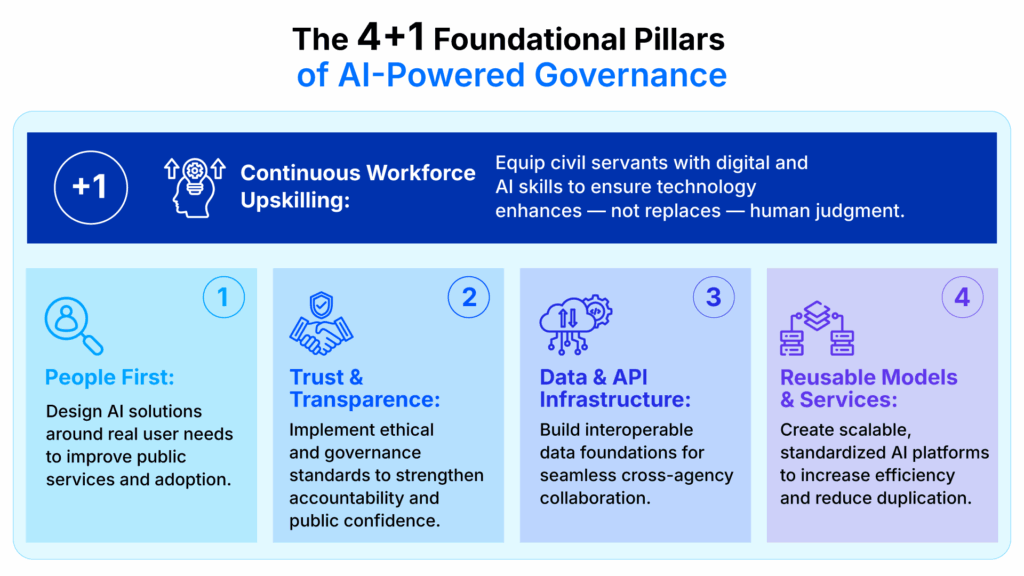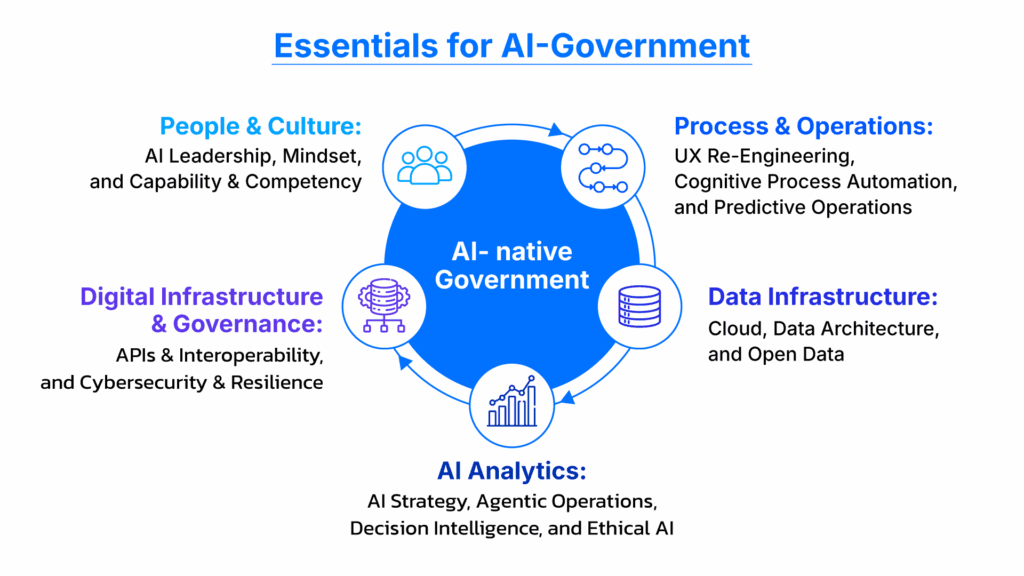Advancing governance through intelligence — enabling public services that are faster, more transparent, and profoundly trusted, powered by data and artificial intelligence.
In Brief
- Governments worldwide are moving beyond digital transformation toward AI-Powered Governance — where intelligence, speed, and transparency redefine public service.
- Achieving this shift requires more than technology — it demands strategic alignment across policy, process, data, and people.
- Global frontrunners such as the U.S., U.K., China, and Singapore show how AI enhances efficiency, accountability, and citizen experience.
- Bluebik stands ready to be Thailand’s strategic partner in shaping an intelligent, trusted, and future-ready government.
The Imperative for Intelligent Governance

The accelerating pace of digital transformation has reached the public sector, compelling governments worldwide to rethink how they operate, deliver, and govern.
Public institutions are no longer evaluated solely on administrative efficiency but increasingly on their capacity to anticipate societal needs, respond with agility, and act with integrity and transparency.
Government officials today face mounting administrative burdens — from verifying documentation and consolidating information to preparing reports, coordinating meetings, and addressing citizen inquiries. These repetitive and time-consuming activities not only impede productivity but also diminish responsiveness to public needs.
With the exponential growth of data and increasing operational complexity, governments are under rising pressure to modernize their structures and adopt AI-enabled systems that enhance precision, foresight, and effectiveness.
The Changing Context for Public Sector Transformation
Three structural forces are reshaping the operational mandate of modern governments:
- Economic Volatility: Thailand’s economic growth trajectory is forecasted to decelerate from 2.5% in 2024 to 1.6% in 2026, reinforcing the urgency for evidence-based policymaking and measurable impact delivery.
- Heightened Citizen Expectations: Citizens now expect digital experiences that are as seamless, transparent, and personalized as those offered by the private sector, demanding a fundamental reconfiguration of public service delivery.
- Workforce Capability and Adaptation: As public functions become more intricate, agencies must elevate workforce productivity through continuous capability building and the adoption of AI technologies that complement human judgment.
The current transition is therefore not a mere administrative enhancement — it represents a paradigm shift in governance toward intelligence-led, data-driven, and citizen-centric operations.
Global Insights: How Leading Nations Leverage AI for Public Value
Across the globe, advanced governments are entering the era of AI-Powered Governance, deploying artificial intelligence as both a strategic and operational lever to achieve transparency, responsiveness, and scalable public outcomes.
The experiences of the United States, United Kingdom, China, and Singapore exemplify how AI has become integral to reshaping institutional design and transforming the citizen experience.
🇺🇸 United States – AI-Driven Border and Document Intelligence
The United States government has adopted AI and machine learning across critical administrative domains — from border management to document digitization — enhancing accuracy, efficiency, and national security.
Border Control Intelligence: Automated facial recognition verifies traveler identities at airports, ports, and land checkpoints, reducing manual inspection and enabling biometric exit systems.
Impact:
- 30–40% reduction in verification time per traveler
- Over 1,600 identity fraud cases detected
- 40,000 visa overstays identified with higher accuracy
AI-Driven Paperless Initiative: Machine learning automates document classification and error detection, supporting a paperless government agenda.
Impact:
- Over 200 million sheets of paper saved annually
- Substantial reduction in tax refund processing times
- Annual storage cost savings exceeding USD 40 million
🇬🇧 United Kingdom – AI for Fiscal Integrity and Citizen Engagement
The United Kingdom has positioned AI as a key instrument to enhance public trust, fiscal transparency, and participatory governance.
Tax Fraud Intelligence: AI models analyze millions of financial transactions and tax submissions to detect anomalies and fraudulent activities.
Impact:
- 60% reduction in audit turnaround time
- GBP 480 million in public funds safeguarded (April 2024 – September 2025)
Citizen View Analytics: Natural Language Processing (NLP) interprets over 50,000 public consultation responses within two hours — a task that once took months.
Impact:
- 99% reduction in analysis time
- GBP 20 million annual savings in analytical manpower
🇨🇳 China – AI for Smart Urban and Administrative Governance
China has embedded AI across the public administration spectrum — from urban traffic optimization to digital government operations.
AI Traffic Management: Real-time analytics from CCTV data predict congestion, optimize signal timing, and coordinate emergency response autonomously.
Impact:
- 10–15% improvement in average traffic flow
- 60% reduction in accident response time
Gov AI Agents: A suite of “AI Digital Civil Servants” now assists 11 major ministries in managing documentation, citizen services, and workflow automation.
Impact:
- 90% reduction in document review time
- Routing accuracy improved from 70% to 90%
- 80% enhancement in cross-agency task efficiency
🇸🇬 Singapore – AI for Public Workforce Productivity
Singapore’s PAIR (Public AI Readiness) initiative introduces generative AI assistants tailored to policy and administrative contexts, enabling public officers to perform high-value analytical and creative tasks.
Impact:
- 46% reduction in administrative workload
- Increased focus on strategic planning and innovation in policy delivery
The 4 + 1 Foundational Pillars of AI-Powered Governance

Comparative analysis across these nations reveals that successful AI adoption in government rests on four structural enablers reinforced by one continuous commitment — human capability.
- People First – Design AI systems around the real needs of public officials and citizens to ensure practical adoption and measurable improvement in service delivery.
- Trust and Transparency – Establish ethical and governance frameworks to uphold accountability and foster citizen confidence in AI-driven processes.
- Data and API Infrastructure – Build robust, interoperable data ecosystems that enable seamless inter-agency collaboration.
- Reusable Models and Services – Develop standardized AI platforms and services that can be scaled and replicated across departments to maximize efficiency and cost-effectiveness.
➕1 Continuous Workforce Upskilling – Institutionalize digital literacy and AI competency as core civil service capabilities, ensuring that technology augments human judgment rather than replaces it.
Thailand’s Pathway to an AI-Powered State
To capture the full potential of AI in public administration, Thailand must chart a clear, phased roadmap that transitions from Digital Government to Intelligent Government — characterized by agility, foresight, and transparency.
The transformation can be conceptualized in three evolutionary stages:
- Now Government – Digital Foundation: Adoption of digital tools to automate administrative workflows, yet operations remain largely fragmented.
- AI-Enabled Government – Assisted Intelligence: Integration of AI and automation to augment decision-making, ensure real-time data sharing, and enhance citizen engagement.
- AI-Native Government – Agentic Intelligence: The advanced stage where AI systems operate autonomously yet ethically, collaborating with humans to deliver predictive, personalized, and data-driven public services.
Progressing along this maturity curve requires more than digital investment — it demands institutional redesign, policy coherence, and leadership alignment.
The Five Essentials for an AI-Ready Government

The foundation of sustainable AI governance rests upon five interlinked domains that must evolve concurrently:
- People & Culture – Cultivate AI leadership, future-oriented mindsets, and a culture of continuous learning within public institutions.
- Process & Operations – Embed cognitive automation and predictive intelligence to improve agility and operational resilience.
- Data Infrastructure – Develop unified, secure, and interoperable data architectures to enable innovation and evidence-based policymaking.
- AI Analytics – Build analytical depth through decision intelligence and ethical AI frameworks that balance efficiency with accountability.
- Digital Infrastructure & Governance – Strengthen cybersecurity, API integration, and AI governance standards to ensure trust and long-term scalability.
Bluebik: Strategic Partner in Building Thailand’s Intelligent Government
The journey from Digital to Intelligent Government represents far more than a technological upgrade — it signifies a strategic transformation of governance, structure, and human capital toward an intelligence-driven future.
Designing a truly AI-Powered Government requires a holistic strategy encompassing Data Vision, AI Governance, Organizational Agility, and Sustainable Capability Building.
Bluebik, as a leading digital transformation consultancy, serves as a strategic partner to public-sector institutions in developing an AI Transformation Roadmap across four dimensions — People, Process, Data, and Governance — enabling measurable transformation and citizen impact.
Through its Management Consulting Services, Bluebik provides end-to-end advisory across:
- Strategy Formulation & Operating Model Design – Defining strategic direction and operational frameworks for AI integration in government systems.
- Performance Improvement – Optimizing structures and workflows to enhance efficiency and accountability.
- Transformation Program Management – Overseeing complex transformation initiatives to ensure delivery of excellence and sustainability.
- Organization & People Transformation – Building agile, future-ready institutions empowered by skilled and adaptive public servants.
With comprehensive expertise spanning strategy, technology, and organizational change, Bluebik is committed to shaping Thailand’s transition toward an AI-Powered Government — one that is transparent, adaptive, and enduringly sustainable.












![Thumbnail [Post Event] HOW](https://bluebik.com/wp-content/uploads/2025/12/Thumbnail-Post-Event-HOW.png)